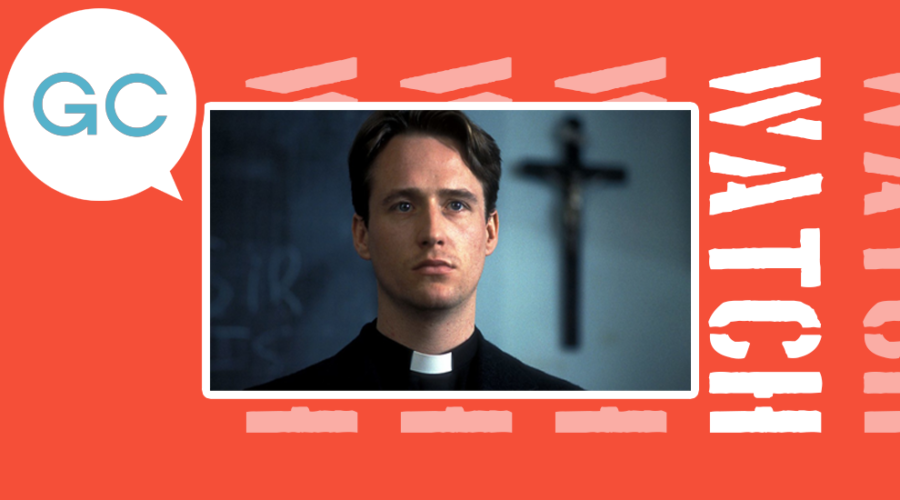Priest, the 1994 film written by Jimmy McGovern and directed by Antonia Bird, meant a lot to me as a young adult trying to emerge from Roman Catholicism into a place where I could be ok with being gay. I owned the film on VHS but lost track of it as technology advanced. I’ve tried to find a way to rewatch it for years, without success, until last weekend.
When I finally found a copy of it, my initial enthusiasm was dampened by nerves: what if it’s one of those things that was deeply meaningful to me at one time, and I’d be bitterly disappointed by seeing it with 25 years of life experience in the bag since I last watched it?
Thankfully, while I did watch it with more distance from the time of life when I was wrangling with these issues so intensely, and I did spot themes and flaws in places I hadn’t spotted them in the 90s, it turns out that 2020s me still felt deeply moved by Priest.
Plus, it was fascinating to spot faces and names of people not well known at the time who have gone on to do great things in films and on TV.
What is Priest about?
Father Greg Pilkington (Linus Roache) arrives to his new Liverpool parish as a somewhat pompous young Catholic priest who’s determined to whip his congregation into shape. When he discovers that Father Matthew Thomas, who he now lives with, is in a long-term relationship with their housekeeper, he reacts critically, moralising about the responsibilities of Catholic clergy to honour their vow of chastity.
The day to day of inner-city work exposes Fr. Pilkington to the realities he’d never faced before and, during Confession, a young girl, Lisa, confesses that her father is abusing her. When her father later confirms – and defends – this abuse, clear that he has no intention of stopping, Greg Pilkington is caught in a seemingly impossible bind: the sanctity of the Confessional means that Catholic priests cannot tell anybody what they hear, but Pilkington knows that by staying silent he is allowing the abuse to continue.
If this was not enough to cause a crisis of faith in the reverent Reverend, we soon learn that Greg is gay, and he hooks up with a man he goes on to see again. But when they are caught, in a car, by the police, his indiscretion ends up on the front page of the local paper.
Father Greg Pilkington’s hit his crisis point.
Breaking down, Pilkington believes his very soul is sinful, and his inability to take action to protect Lisa – thanks to the seal of the Confessional – compounds his sense of hopelessness and his crisis of faith.
Can Lisa escape her abusive dad? Can Greg ever face his parishioners again? Those questions are answered in the film in a cathartic, devastating finale.
What’s the verdict?
I usually make a point not to read other reviewers’ thoughts on a film or book I’m going to review, but I’ve seen the existing reviews so many times over the years that I can’t make myself forget what they say. Reviewers are split.
There are those, like me, who find Priest a powerful and evocative depiction of a crisis of faith, of the hypocrisy and terrible behaviour of some believers, and of the almost ominous power of the church.
Others, meanwhile, think Priest goes too hard and is overly moralising, making its point too bluntly.
Oh, and there were those who thought it was blasphemous, like the Catholic Church in Ireland, the Catholic League in the US and the American Life League, and who tried to get it banned. But they are not opinions I have much time for. I have even less time for the reaction by those who sent bomb threats to venues for showing the film.
With the more sensible critics in mind, I do concede that there is a point in Priest when Greg’s colleague Fr. Thomas gives an impassioned speech to his congregation following Greg’s exposure, which could certainly be seen as sanctimonious. But in the 90s, in the very Catholic Liverpool Archdiocese where I grew up and where this film is set, his message was radical and it was daring.
I can appreciate why people who did not grow up gay in a deeply religious environment might find this film a bit much, or might not appreciate the depth of Fr. Pilkington’s fear, powerlessness and self-loathing.
But for those of us whose religions made it considerably harder to deal with a core aspect of ourselves, Priest is a difficult and horribly familiar story, but one that is, to some degree at least, cleansing and healing.
Salvational, you might say.

